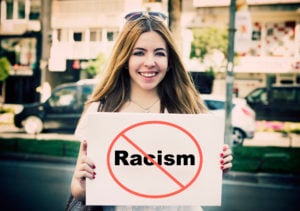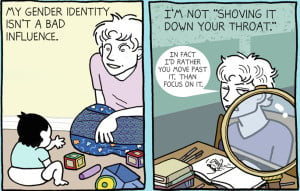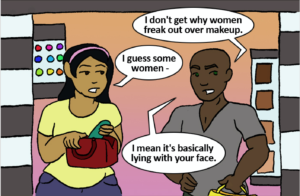
Source: iStock
I’m trying to figure out who I am as a Black American. This is nothing new – exploring identity is pretty much the story of my life, of why I write, of how I express myself and why present myself to the world in the way that I do.
Recently, a very complex question has entered the picture.
Can I, as a Black American, adopt self-selected elements of African cultures without causing harm through cultural appropriation?
Usually, the question of appropriating culture comes down to whether or not I’m taking from an oppressed group to which I don’t belong. I know that I can claim Black American culture as my own. I know that my father immigrated to the US from Trinidad & Tobago, so I can claim Trinidadian culture, too.
But when it comes to tracing my roots to Africa, the question of where I “belong” gets complicated.
The truth is, like so many other Black Americans who are not of recent African descent, there’s no easy way to understand my identity in the US.
It’s not as if we have a fond immigration story of how we landed here. Our identity is inextricably linked to slavery – our ancestors were violently kidnapped from their homes, brought here in chains, auctioned, sold, and forced to work on plantations.
The stories of Black people in the US who weren’t enslaved are almost completely absent from our educational system. So like many Black Americans, those horrific stories of slavery are all I know about that side of my ancestry. The story of how I came to be is a story of being ripped further and further from the shores of Africa, not just living in the United States, but assimilating to the dominant culture ruled by white supremacy.
This white supremacist dominance discourages reminders of our connection to the Africa our ancestors know – everything from our natural hair to spiritual practices to traditional “ethnic” clothing that do not fit in with Western standards of appearance.
So I can’t help but feel hurt by the suggestion that African cultures aren’t mine to connect with.
Some say that because I’m American, I’m stealing parts of other peoples’ identities when I self-select elements of African culture. But for me, I’m engaging in a practice of remembering my African roots, which is a way to love myself and resist the anti-Black pressure to assimilate.
There’s a reason I prefer to be called Black, rather than African-American (and it’s not because I’m ashamed of being African). My identity isn’t as simple as saying that my blood is African and my nationality is American. It can’t be contained by the national borders drawn by colonialism and imperialism.
I am a child of the Black diaspora, part of the Black family spanning from Africa to South America to the West Indies to North America and more. To be proud of myself as a Black American is to remember all of the places I am from.
Then again, I don’t even know exactly where I’m from.
Africa is a vast continent made of many, many different countries, tribes, ethnicities, and traditions. Is it insulting to Africans for me to group all of them together, as if “Africaness” is something tangible to connect to – or am I honoring the many different places my ancestors might have been throughout the diasporic journey leading up to my birth?
I research folklore and spiritual figures from Africa and incorporate their stories into my creative writing – but I don’t know which of those stories are really mine to tell. I borrow head wrap techniques from African fashion bloggers – but I don’t know if I share roots with them. I listen to musicians like Rokia Traoré – but I have to admit that I hardly know anything about her country of Mali, except that I like her sound.
According to my own words, this sounds an awful lot like cultural appropriation.
However, slavery destroyed the records of many of our family trees, so it’s difficult – if not impossible – for me to know which African traditions belong to my ancestry and stick to those. So it’s true that I’m picking the parts of African cultures that I like without fully understanding their significance.
This might mean that, no matter how pure my intentions, I could cause harm by adopting elements of African culture as part of my self-expression. To find out if my actions are harmful, we have to get into the details.
When White Americans Appropriate African Cultures
I don’t mean to cause harm when I take on elements of African cultures – and some people think that’s the end of the story. But because it’s possible to cause a harmful impact even without harmful intentions, I’m thinking twice about it.
I have to think about the context of how I can participate in and contribute to oppressive systems by borrowing from other cultures. I have to think about the impact.
That’s all included in the definition of cultural appropriation – not just the act of borrowing from another culture, but the power dynamic of being part of a group that holds privilege over the group you’re borrowing from.
Just think about the impact when white Americans appropriate elements of African cultures.
For instance, they ignore the historical and cultural context of what they’re doing when they travel to African countries and return wearing fabrics “inspired” by the clothing they saw. They’re following colonial traditions of exploiting Africa’s resources without supporting its people.
They often wear these clothes just to have fun or be edgy – dismissing the fact that many African people have had to fight to maintain their own cultural traditions because the Western world has stigmatized them as “uncivilized.”
African people are still recovering from the impact of 19th century missionaries who demonized their practices, abolished their clothing, nudity, and language, and forced them to adopt conservative styles of dress.
White American fashion designers also take “inspiration” from Africa – by stealing designs without crediting their creators, using white models to promote their plagiarized creations, and trivializing the meaning of what they’re stealing by reducing its significance to materialistic pursuits.
By profiting from what they believe to be more fashionable, more “respectable,” more appealing versions of African styles, they reinforce the idea that African people are inferior, their traditions valuable only when adapted for white Westerners’ comfort.
These are all examples of how Africans are systematically denied the benefits of privilege that white Americans have.
While Africans in the US (and even in African countries taken over by Western imperialism) have to assimilate to Western dress to be viewed as professional or even “normal,” white folks can have fun, gain profit, and earn “cool points” among each other by taking African styles.
This clearly has a negative impact on African people. As Makokha writes, “When white people are today allowed to exploit their power by profiting from the commercial use of the traditional cultural markers of African peoples, this deepens existing divides between the West and Africa, thereby preserving white dominance.”
I use these examples because we can’t talk about cultural appropriation without acknowledging white supremacy. That doesn’t mean people of color can never appropriate from each other – but within the context of Western imperialism, cultural appropriation has been a weapon wielded against people of color for centuries.
It’s important to acknowledge this context that makes cultural appropriation such a violently harmful force that destroys people’s livelihoods across generations. Appropriating other cultures means actively contributing to a system of oppressing huge groups of people while those with privilege benefit from their pain.
That’s not something I want to participate in.
What About When Black Americans Borrow from African Cultures?
There are some key differences between what happens when Black Americans borrow from African cultures and when white Americans do it.
For instance, if I wear an outfit inspired by African style, I don’t do it to be cool or edgy. In fact, it usually has the opposite effect – as a person of color breaking away from the Eurocentric norms of US fashion, I can be regarded as unprofessional, strange, or even dangerous.
And I’m not doing it to claim that I wore it first, or better, or to erase where it’s from. I’m celebrating my African roots, instead of believing the lie that they’re something to be ashamed of.
For me, incorporating African elements into my personal style has a much deeper meaning than a superficial fashion choice. It’s a tool for liberating myself from the pressure of assimilating to white culture, for healing my painful disconnection from my ancestry, and for recovering that lost connection in any way I can.
Considering that the violence of chattel slavery is what brought my ancestors to this country, it’s dangerous for me to accept that the US’s Eurocentric culture is all I have to hold on to. Of course, Black American culture is present and beautiful and a big part of my identity as a Black woman in the US. But it’s also linked to the cultures we were forced to leave behind in Africa.
As Thea Monyee’ writes in “Black People Need to Break Up with White Culture,” “The ongoing myth that black culture is ‘made in America’ prevents black culture from defining itself through the lens of African culture from which it has descended.”
With genres like gospel and hip-hop, we have music and dance honoring the traditions our ancestors brought to this country. With folklore, oral storytelling, and language, we refuse to forget how our enslaved family members survived and communicated before and during their enslavement. With moments like the Black Power movement, we’ve maintained our connection to Africa as an empowering source of pride.
When we develop new practices and traditions – everything from Black Twitter hashtags to music festivals to fashion trends – it all comes from our collective resilience. Resistance to white supremacy has been passed down to us through generations, from the time when it was an essential tool for surviving slavery. Resilience is an undeniable aspect of who we are as Black people.
We deserve to remember who we are and where we came from, instead of being ashamed of ourselves and trying to assimilate into a white supremacist ideal that was never designed for us to fit.
How Can Black Americans Know If We’re Appropriating Another Culture or Honoring Our Own?
Exploring this question hasn’t brought me any easy answers, but I’ve reached this conclusion: If I’m going to express myself through elements of African cultures, I have to be responsible about it.
After all, I live in the US, so I have Western privilege and it’s possible for me to participate in the system of exploiting and exotifying non-Western cultures and harming other people – even if I don’t mean to.
Here are a few ways Black Americans can avoid crossing the line into appropriative harm when we adopt elements of African cultures.
1. Learn about What You’re Using
We can cause harm by homogenizing the entire continent of Africa as one monolithic resource to draw inspiration from. Rather than simply calling our Afrocentric expression “African,” let’s learn about the heritage and traditions we’re connecting with.
That means no longer listening to Rokia Traoré for her voice and nothing else – in order to really appreciate her as an artist, I need to know about her country, Mali, and her ethnic group, the Bambara.
Her incredible story of using Mali’s ancient music tradition to honor the women in her village in a time of war is well worth including in my understanding of why she creates the music she does. Learning about her and her family deepens my appreciation for her music, and it also allows me to recognize her as an individual – instead of erasing who she really is by simply thinking of her as an African singer whose music sounds nice.
Whether it’s music, clothes, or something else from Africa, take the time to learn about what you’re borrowing so you can honor and appreciate its true meaning.
2. Support African Suppliers of What You Buy
I’m inspired by African head wrapping techniques – but when I use them to wrap a scarf I bought at Target, I’m just giving my money to the (mostly white) heads of corporations that profit from African designs without crediting or compensating the artists they’ve stolen from.
It would make a huge difference to purchase directly from African designers and artists instead. Then it’s an equally beneficial exchange, instead of a one-sided exploitation that allows me to benefit and keeps them from supporting themselves.
I can support their economies, instead of participating in the Western imperialist system of stealing their resources and depleting them of what they need to survive.
3. Know Some Things Are Off-Limits
Through the process of learning about what I’m borrowing and getting it directly from African people, I’ll inevitably come across something that I want, but shouldn’t take.
If I find a printed fabric that would look gorgeous on my skin, for instance, it would be hard to resist making it part of my wardrobe.
But what if I find out that fabric is used to designate a revered position in a certain tribe? If I wear it outside of that context, I’d be trivializing the deep meaning the print holds for the people who created it.
Sure, if I came across the print at Urban Outfitters, I can just buy it and ignore its meaning. But I really shouldn’t. I can show respect by finding another way to put those gorgeous colors on my skin – it sounds like a good opportunity for a manicure!
As Black Americans, not everything African is ours to claim – we can leave some things alone if our position as Western people means we’re trivializing something with a sacred meaning that we can’t properly honor.
4. If Possible, Learn About Your African Heritages
Of course, the easiest way to avoid cultural appropriation is to stick to the traditions of your own culture. Clearly, this step is complicated for Black Americans. Many of us just can’t find where in Africa our ancestors lived before they were enslaved.
But if you have access to those records, it could be a great experience to learn about your African ancestry. Even if you can’t trace your own ancestry, expanding your knowledge of the various nations and cultures of Africa can help you resist believing in common stereotypes and misconceptions about African life.
That can give you a more authentic and enriching experience if you find elements of African culture you’d like to connect with.
5. Talk to African People
You don’t have to be completely on your own as you figure out how to best adopt elements of African culture without causing harm. In fact, you’d be a lot better off listening directly to African people, rather than taking guesses about what’s harmful or not.
Even though I know a lot about cultural appropriation and my personal connection to the African diaspora, it’s not up to me do decide whether or not I’m harming African people by adopting elements of their culture. I can do my own work of researching and reflecting, but that can only take me so far.
The best way to avoid causing harm is to listen to the people who are harmed by the appropriation of their culture.
Say I like the jewelry a Nigerian friend is wearing – a necklace with a symbol I don’t recognize. Instead of just deciding it looks cool and making it my own, I can ask my friend what it means and if it’d be disrespectful for me to wear it.
If it’s not, then chances are, she could get me the hook-up to support a Nigerian artist who makes similar necklaces – another opportunity for me to ask someone about the best ways to support their work without exploiting it.
We can learn a lot by asking questions, listening, and reading what African people have to say about sharing their culture.
What This Means for My Cultural Identity
Reflecting on this gives me a new perspective on the confusing concept of “my culture.” I am Trinidadian, a Black American, and a descendant of Africans.
This makes me unique, but it also connects me to the experience of so many other Black people. We are all around the world, with diverse histories, traditions, and communities. Each of us expresses our Blackness in a special way.
Which means we share something that goes deeper than skin color or clothing or music. That connection is worth holding on to. If we can use it for our own healing, liberation, and support for one another as diverse members of one beautiful diaspora, I believe it’s also worth figuring how to do it without causing harm.
[do_widget id=’text-101′]
Maisha Z. Johnson is the Digital Content Associate and Staff Writer of Everyday Feminism. You can find her writing at the intersections and shamelessly indulging in her obsession with pop culture around the web. Maisha’s past work includes Community United Against Violence (CUAV), the nation’s oldest LGBTQ anti-violence organization, and Fired Up!, a program of California Coalition for Women Prisoners. Through her own project, Inkblot Arts, Maisha taps into the creative arts and digital media to amplify the voices of those often silenced. Like her on Facebook or follow her on Twitter @mzjwords.
Search our 3000+ articles!
Read our articles about:
Our online racial justice training
Used by hundreds of universities, non-profits, and businesses.
Click to learn more
Most Read Articles
- « Previous
- 1
- …
- 30
- 31
- 32



















